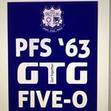Farouk Gulsara's Blog, page 119
October 13, 2018
Silence is a rare commodity
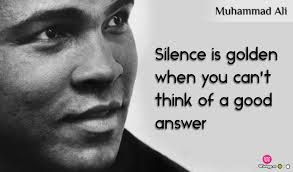 Silence is golden, they say. Sometimes all that you needed to do was to do nothing. Precious time can be used to ponder, meander and introspect. These things are necessary to take stock of our performances in our duties as parents, siblings, offspring, employers, employees, pet owners or just as a mere person. Libraries, parks, open spaces, temples of worship and wilderness once were freely available for this purpose.
Silence is golden, they say. Sometimes all that you needed to do was to do nothing. Precious time can be used to ponder, meander and introspect. These things are necessary to take stock of our performances in our duties as parents, siblings, offspring, employers, employees, pet owners or just as a mere person. Libraries, parks, open spaces, temples of worship and wilderness once were freely available for this purpose.On the one hand, we say that resting is part of training and that still water runs deep or that only the empty makes the loudest noise. In the same breath, we also say that an idle mind is the devil's workshop as if that our brain must always be doing something at all times.
Perhaps, it was a ploy by the people is power so as not to make his subjects a thinking lot. The modus operandi is to keep their minds occupied only with their the almighty bosses' rhetorics - no place for the lowly minions to start using the brains to start a revolution!
Fast forward to the present time, they are at it still. Our minds are constantly bombarded with stimuli, be it visually, auditorily, aurally or by other suggestions. Look at the library. There are computer terminals which have connections to the world wide web. Even in solitude, man is not an island. He is in touch with the rest of the world via his hand-held devices. His daily life is inundated with snippets of jingles and advertisements.
At no time is Man's grey cells indeed at a standstill. It is consistently being overwhelmed with neuronal transmissions, Even at sleep, with all effort by the subconscious mind to purge off unnecessary information through dreams, there is no true silence of the brain.
Silence is not only golden as it prevents embarrassment when we cannot think of a right answer, but it also paves a platform to look at our position in a third person's perspective. Things always seem crystal clear from the outside.
https://asok22.wixsite.com/real-lesson

This work is licensed under a Creative Commons Attribution 4.0 International License.http://asok22.wix.com/real-lesson
http://.facebook.com/farouk.gulsara
www.riflerangeboy.com

Published on October 13, 2018 15:08
October 11, 2018
Córdoba's Mesquita
One of the sites that should not miss if you happen to be around the Spanish ring is Córdoba. The one place that defines Córdoba is the Mosque-Cathedral of Córdoba (@Mezquita) and its Bell Tower. Most of it early history is only through oral tradition. Very little is actually known about its origin. Legends say that it started as a small church dedicated to their patron saint St Vincent during the Visigoth era. Emir Abdul-al-Rahman I from the Ummayad kingdom who conquered the Iberian peninsula actually shared part of the building for the Muslim worshippers. He later bought over the rest of the erection and started construction of a grand mosque.

The result is a majestic building which boasts of the splendour of incorporation of Roman columns, Goth architecture, Rennaisance and Caliphal designs all into one. This historic site has gained UNESCO World Heritage status.In its pre-Reconquista heydays, it used to be a medical and educational hub as well as a place of silk production.
 At the entry of the Mosque-Cathedral. Note the Roman styled bridge over Guadalquivir ©FG
At the entry of the Mosque-Cathedral. Note the Roman styled bridge over Guadalquivir ©FG
 The entrance ©FG
The entrance ©FG
 ©FG
©FG
 The characteristic Roman arches with maroon-beige striation for which the Mosque-Cathedral is known for. ©FG
The characteristic Roman arches with maroon-beige striation for which the Mosque-Cathedral is known for. ©FG
 ©FG
©FG
 ©FG
©FG
 ©FG
©FG
 Mihrab (directed toward Mecca) ©FG
Mihrab (directed toward Mecca) ©FG
 The intricate Cathedral ceiling quite advanced for its age. ©FG
The intricate Cathedral ceiling quite advanced for its age. ©FG
 The Chapel ©FG
The Chapel ©FG
 The Bell Tower formerly was a minaret for the mosque. ©FG
The Bell Tower formerly was a minaret for the mosque. ©FG
N.B. With all the globalisation and borderless world concept, it was no surprise that besides the usual tapas and paella, that óne of the best briyani can be tasted in a small restaurant in the narrow streets of Cōrdoba manned by a Pakistani immigrant. Trust TripAdvisor to pick it out! http://asok22.wix.com/real-lesson
http://.facebook.com/farouk.gulsara
www.riflerangeboy.com

The result is a majestic building which boasts of the splendour of incorporation of Roman columns, Goth architecture, Rennaisance and Caliphal designs all into one. This historic site has gained UNESCO World Heritage status.In its pre-Reconquista heydays, it used to be a medical and educational hub as well as a place of silk production.
 At the entry of the Mosque-Cathedral. Note the Roman styled bridge over Guadalquivir ©FG
At the entry of the Mosque-Cathedral. Note the Roman styled bridge over Guadalquivir ©FG
 The entrance ©FG
The entrance ©FG ©FG
©FG The characteristic Roman arches with maroon-beige striation for which the Mosque-Cathedral is known for. ©FG
The characteristic Roman arches with maroon-beige striation for which the Mosque-Cathedral is known for. ©FG ©FG
©FG ©FG
©FG ©FG
©FG Mihrab (directed toward Mecca) ©FG
Mihrab (directed toward Mecca) ©FG The intricate Cathedral ceiling quite advanced for its age. ©FG
The intricate Cathedral ceiling quite advanced for its age. ©FG The Chapel ©FG
The Chapel ©FG The Bell Tower formerly was a minaret for the mosque. ©FG
The Bell Tower formerly was a minaret for the mosque. ©FGN.B. With all the globalisation and borderless world concept, it was no surprise that besides the usual tapas and paella, that óne of the best briyani can be tasted in a small restaurant in the narrow streets of Cōrdoba manned by a Pakistani immigrant. Trust TripAdvisor to pick it out! http://asok22.wix.com/real-lesson
http://.facebook.com/farouk.gulsara
www.riflerangeboy.com

Published on October 11, 2018 09:04
October 9, 2018
Rewriting history?
Dedicated to Nadia Murad, a survivor of sexual violence by the Islamic State. 2018 Nobel Prize for Peace.
Warning: For mature readers only.
Discretion advised.
The Impact of Islam (2014)
Author: Emmet Scott
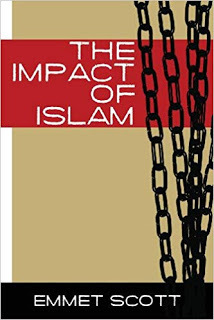
My Muslim friends would not like the contents of this book. In the same vein as Darío Fernández-Morera's 'The Myth of Andalusia', the author tries to rewrite world history as we know it.
The world talks about the Golden Age of Islam of a time when the areas administered by the Muslims were at the epitome of culture and Arab was the lingua franca whilst Europe was in the Dark Ages. The truth, according is from the truth. In fact, it is just the opposite.
The region of the Golden Era, Spain, has been having its own development towards the tail end of the Roman Empire. The Visigoths showed the building prowess constructing large churches with intricate designs. The art of distillation, advances in Mathematics (algebra, number zero and trigonometry), paper printing, silk and gunpowder which are traditionally credited to the Muslims are not indeed their discoveries. Distillation has its roots in Babylonia. Mathematics developed in India and the Chinese are credited for the rest. The Arab contributed nothing. They were barbaric illiterate brash horsemen who were only keen on plundering and destroying anything in their path. Many of peaceful reign and so-called atmosphere for culture were made by non-Arabic converts from Persia, Turks and Mongols. The Arab language commonly used did not mean that they were Arabs by race.
The invaders perhaps helped in the dissemination of knowledge from one part of the world to another, but it was waiting to happen anyway, with or without their intervention. True, the religion promised justice to many underprivileged members at that time, but three members of the society were still marginalised- women and boys, slaves and non-Muslims (kefir).
Slave trade was on a downward trend by the 8th century when Christianity in Europe started talking about equality and human rights. But the Muslim conquerors reignited this trade and made slavery a lucrative market. In fact, the demand for white-skinned slaves drew the Vikings to capture North Europeans. Berber pirates were also active in the high seas to capture European merchant ships and to sell off the crew as white slaves.
In Europe, the Renaissance happened way before the often perceived 14th - 16th centuries. The Benedictine monks worked hard at improving agricultural yields, windmill technology, animal domestication, use of collars that aid use of horses for ploughing and more. Scholastic studies continued. Healing of the sick via plant-based medication and the establishment of hospitals were initialised.
Maybe unfairly, the author accuses the Muslim conquerors, from Abd' er Rahman (756AD) onwards to have set the brutal standards upon which future wars were to be fought. In this way, he justifies the brutality shown by the Spanish Conquistadores on the South Americans and the Crusaders upon their enemies.
Describing Jews as 'The People of the Book' and enjoyed cordial relations with the invaders is a creative fiction. Animosity between the Muslims and the Jews go back to the time of the prophet. Collection of jiziya from non-believers was big business, and the Almohads and the Almoravids, Muslim armies from North Africa found out the hard way that enormous destruction on the Christian and Jewish stronghold was counter-productive as loss of revenues was quite debilitating. They also realised that mass conversion was self-defeating even though the urge to create Darul Islam was overwhelming.
The prosecution of Jews is said to have been initiated in Cordoba and Granada under the watchful eyes of their Muslim conquerors. This is supposed to be the blueprint for other similar aggression against the Jews including the ones conducted by Christian mobs in Rhineland and the rest of Europe. The idea of violence in the name of Christ started here. Indirectly, Mahmud of Ghazni's invasion of India is the genesis of militant Hindus in centuries to come!
The most brutal part of the book must surely be the appendix which gives the final blow to Islam. It questions the existence of Prophet Muhammad and accuses Muslim Arabs as merely a Christian sect called Ebionites who revere the teachings of Moses but not accepting Jesus as the son of God. The Ebonites or Arab Christians, with their Proto-Islam, managed to impress the Sassanids who embraced their belief. The original Quran was apparently written in Syriac script, hence the confusion about 72 virgins and 72 grapes in paradise. Muhammad, as mentioned in the holy scriptures, are no other than that of Jesus. The Quran is a Christian text and corruption in the language and confusion between Joshua and Jesus led to this problem.
Quite a controversial book, this one. Unlike the believers who think that the religion is all-encompassing able to stand the test time, it compares Islam to many of the failed political ideologies that the world has seen. Like communism, despotism and fascism which clamours of a fabled time of past glory and a utopia of rainbows and unicorns, it accuses its followers of imagining a fictitious past that never existed. In the same modus operandi as Pol Pot and his Khmer Rouge regime, they wish to rewrite human history and start with Year Zero.
https://asok22.wixsite.com/real-lesson

This work is licensed under a Creative Commons Attribution 4.0 International License.http://asok22.wix.com/real-lesson
http://.facebook.com/farouk.gulsara
www.riflerangeboy.com
Warning: For mature readers only.
Discretion advised.
The Impact of Islam (2014)
Author: Emmet Scott

My Muslim friends would not like the contents of this book. In the same vein as Darío Fernández-Morera's 'The Myth of Andalusia', the author tries to rewrite world history as we know it.
The world talks about the Golden Age of Islam of a time when the areas administered by the Muslims were at the epitome of culture and Arab was the lingua franca whilst Europe was in the Dark Ages. The truth, according is from the truth. In fact, it is just the opposite.
The region of the Golden Era, Spain, has been having its own development towards the tail end of the Roman Empire. The Visigoths showed the building prowess constructing large churches with intricate designs. The art of distillation, advances in Mathematics (algebra, number zero and trigonometry), paper printing, silk and gunpowder which are traditionally credited to the Muslims are not indeed their discoveries. Distillation has its roots in Babylonia. Mathematics developed in India and the Chinese are credited for the rest. The Arab contributed nothing. They were barbaric illiterate brash horsemen who were only keen on plundering and destroying anything in their path. Many of peaceful reign and so-called atmosphere for culture were made by non-Arabic converts from Persia, Turks and Mongols. The Arab language commonly used did not mean that they were Arabs by race.
The invaders perhaps helped in the dissemination of knowledge from one part of the world to another, but it was waiting to happen anyway, with or without their intervention. True, the religion promised justice to many underprivileged members at that time, but three members of the society were still marginalised- women and boys, slaves and non-Muslims (kefir).
Slave trade was on a downward trend by the 8th century when Christianity in Europe started talking about equality and human rights. But the Muslim conquerors reignited this trade and made slavery a lucrative market. In fact, the demand for white-skinned slaves drew the Vikings to capture North Europeans. Berber pirates were also active in the high seas to capture European merchant ships and to sell off the crew as white slaves.
In Europe, the Renaissance happened way before the often perceived 14th - 16th centuries. The Benedictine monks worked hard at improving agricultural yields, windmill technology, animal domestication, use of collars that aid use of horses for ploughing and more. Scholastic studies continued. Healing of the sick via plant-based medication and the establishment of hospitals were initialised.
Maybe unfairly, the author accuses the Muslim conquerors, from Abd' er Rahman (756AD) onwards to have set the brutal standards upon which future wars were to be fought. In this way, he justifies the brutality shown by the Spanish Conquistadores on the South Americans and the Crusaders upon their enemies.
Describing Jews as 'The People of the Book' and enjoyed cordial relations with the invaders is a creative fiction. Animosity between the Muslims and the Jews go back to the time of the prophet. Collection of jiziya from non-believers was big business, and the Almohads and the Almoravids, Muslim armies from North Africa found out the hard way that enormous destruction on the Christian and Jewish stronghold was counter-productive as loss of revenues was quite debilitating. They also realised that mass conversion was self-defeating even though the urge to create Darul Islam was overwhelming.
The prosecution of Jews is said to have been initiated in Cordoba and Granada under the watchful eyes of their Muslim conquerors. This is supposed to be the blueprint for other similar aggression against the Jews including the ones conducted by Christian mobs in Rhineland and the rest of Europe. The idea of violence in the name of Christ started here. Indirectly, Mahmud of Ghazni's invasion of India is the genesis of militant Hindus in centuries to come!
The most brutal part of the book must surely be the appendix which gives the final blow to Islam. It questions the existence of Prophet Muhammad and accuses Muslim Arabs as merely a Christian sect called Ebionites who revere the teachings of Moses but not accepting Jesus as the son of God. The Ebonites or Arab Christians, with their Proto-Islam, managed to impress the Sassanids who embraced their belief. The original Quran was apparently written in Syriac script, hence the confusion about 72 virgins and 72 grapes in paradise. Muhammad, as mentioned in the holy scriptures, are no other than that of Jesus. The Quran is a Christian text and corruption in the language and confusion between Joshua and Jesus led to this problem.
Quite a controversial book, this one. Unlike the believers who think that the religion is all-encompassing able to stand the test time, it compares Islam to many of the failed political ideologies that the world has seen. Like communism, despotism and fascism which clamours of a fabled time of past glory and a utopia of rainbows and unicorns, it accuses its followers of imagining a fictitious past that never existed. In the same modus operandi as Pol Pot and his Khmer Rouge regime, they wish to rewrite human history and start with Year Zero.
https://asok22.wixsite.com/real-lesson

This work is licensed under a Creative Commons Attribution 4.0 International License.http://asok22.wix.com/real-lesson
http://.facebook.com/farouk.gulsara
www.riflerangeboy.com

Published on October 09, 2018 09:30
October 7, 2018
Of espionage, fags and blocks...
Confessions. For years I have been going to his house functions only to listen to his stories. All the small talks with the other guests just bore so quickly; his presence was the motivating factor that draws me there. With his ever-smiling demure and his stories that transport me to a time when my country was a fledgeling confluence of people trying to stand together under the shade of a flag of a country named Malaya, Uncle Kesavan was the reason I was there.
Now aged 84 years old, he is still so passionate about his work that he will painstakingly tell every detail of the time when he was almost working like a secret agent, minus the licence to kill. His team, of the Malaysian Royal Police, was the pioneer in the heeding times of the communist insurgency. They were sent to the UK to learn the then-novel way to intercept communists' radio transmissions. From the stories, or rather life experiences, that he narrated, he must be easily thousands of unsung heroes in this country who are yet to be given due recognition.
He is a living example of how one can give up smoking just at the snuffing of a cigarette butt. It was a time when he was almost in his late 50s that he fulfilled his pilgrimage at a holy shrine in India. Due to pressures of his work and the company that he kept, he was already a chain-smoker, burning 60 sticks a day. Just after completing his religious obligations, after descending the hill that held the diety of his liking, he lit his first 'post-Enlightenment' fag. He felt an instant dislike to it. Thinking that the stick was a defective one and he lit another. And that was the last stick of cigarette that he ever held. He is living proof that willpower alone (maybe with a little divine intervention) can stop any addiction.
Then a few years later, after losing his dear beloved and fulfilling his fatherly duties, he was feeling a little queasy over his chest. To the utter disbelief of the attending medical practitioners, he was diagnosed to have four critical blockages in his coronary vessels. He was labelled by the cardiologists as a walking timebomb, that his situation was precarious and needed urgent intervention. Contrary to his physicians' advice, Uncle Kesavan, by then around 70, decided that his modality of treatment would be masterly inactivity. Despite his doctors' predictions of not lasting Long enough to celebrate the next new year, he defied medical wisdom and is living to tell his stories still, some fifteen years later; perhaps even outliving some of his learned caregivers. Now and then, we have outliers. He must be one. Now aged 84 years young, he is grinning from ear to ear at the launch of his story in a book written by his daughter.
 S Kesavan PPN, PPM, GSM
S Kesavan PPN, PPM, GSM
https://asok22.wixsite.com/real-lesson
This work is licensed under a Creative Commons Attribution 4.0 International License.http://asok22.wix.com/real-lesson
http://.facebook.com/farouk.gulsara
www.riflerangeboy.com
Now aged 84 years old, he is still so passionate about his work that he will painstakingly tell every detail of the time when he was almost working like a secret agent, minus the licence to kill. His team, of the Malaysian Royal Police, was the pioneer in the heeding times of the communist insurgency. They were sent to the UK to learn the then-novel way to intercept communists' radio transmissions. From the stories, or rather life experiences, that he narrated, he must be easily thousands of unsung heroes in this country who are yet to be given due recognition.
He is a living example of how one can give up smoking just at the snuffing of a cigarette butt. It was a time when he was almost in his late 50s that he fulfilled his pilgrimage at a holy shrine in India. Due to pressures of his work and the company that he kept, he was already a chain-smoker, burning 60 sticks a day. Just after completing his religious obligations, after descending the hill that held the diety of his liking, he lit his first 'post-Enlightenment' fag. He felt an instant dislike to it. Thinking that the stick was a defective one and he lit another. And that was the last stick of cigarette that he ever held. He is living proof that willpower alone (maybe with a little divine intervention) can stop any addiction.
Then a few years later, after losing his dear beloved and fulfilling his fatherly duties, he was feeling a little queasy over his chest. To the utter disbelief of the attending medical practitioners, he was diagnosed to have four critical blockages in his coronary vessels. He was labelled by the cardiologists as a walking timebomb, that his situation was precarious and needed urgent intervention. Contrary to his physicians' advice, Uncle Kesavan, by then around 70, decided that his modality of treatment would be masterly inactivity. Despite his doctors' predictions of not lasting Long enough to celebrate the next new year, he defied medical wisdom and is living to tell his stories still, some fifteen years later; perhaps even outliving some of his learned caregivers. Now and then, we have outliers. He must be one. Now aged 84 years young, he is grinning from ear to ear at the launch of his story in a book written by his daughter.
 S Kesavan PPN, PPM, GSM
S Kesavan PPN, PPM, GSMhttps://asok22.wixsite.com/real-lesson

This work is licensed under a Creative Commons Attribution 4.0 International License.http://asok22.wix.com/real-lesson
http://.facebook.com/farouk.gulsara
www.riflerangeboy.com

Published on October 07, 2018 09:01
October 5, 2018
Managing a free market is expensive.
Billion Dollar Whale (2018)
Authors: Tom Wright & Bradley Hope
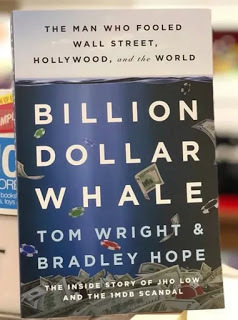 The world has all the resources to feed Man but not his greed. Going through the book, it is evident that the world only caters for the high-heeled. Try borrowing a couple hundreds of bucks from a banking institution or transfer some money. The paperwork and the confusing legalese jargon that one has to go through would make the borrower feel like a criminal.
The world has all the resources to feed Man but not his greed. Going through the book, it is evident that the world only caters for the high-heeled. Try borrowing a couple hundreds of bucks from a banking institution or transfer some money. The paperwork and the confusing legalese jargon that one has to go through would make the borrower feel like a criminal.
All these formalities remain so, formalities, when it comes to the megarich. Rules are purposely made to rein and ruin the poor. Money flows seamlessly from the rich to the rich, across borders and without sureties. Compliance procedures are ignored. Standard practices take a back seat. The hidden forces from unknown places show their presence. The rest of the public, being oblivious or choosing to stay ignorant just join the gravy train.
The whole establishment seems aware of everybody's misconduct around the world. Adequate laws have been enacted to curb any wrongdoing. Still, crime happens. Doing business has become so competitive, and people have grown impatient to be on top of their pile of cash and pot of gold that they bend the rules. They do mind getting caught as the long arm of the law takes a mighty long time to pin them down. Members of their legal teams are getting increasingly smarter to get them off the hooks on technicalities. Whatever loss is made, the bankers still reward themselves handsomely. By the time their foolhardy comes to light, they are long gone, and the tracks have disappeared long ago. The international laws are all impotent at best in preventing wrongdoings or at retrieving the laundered money to laymen, people of the country, upon whose shoulders the brunt of the economic downturn falls.
The establishments have accepted the fact doing business is risky and losing money to cheats and running afoul with the law are part and parcel of doing business, especially with the leaders of tyrannical governments of the third world. Money linked with developed countries are so regulated that it cannot be moved at it, With developing countries, their leaders are given carte blanche to treat their kitty and the national coffers as one and the same bottomless pit.
 When the cat is belled, the mice come out to play!With excellent skills of investigative journalism, these two Wall Street Journal reporters (Wright and Hope) explore the events of how a young punk cajoles the royalties of Saudi and Emirates, the Malaysian Government via its investment company 1MDB, the Hollywood fraternity and the whole banking network to finance his mega projects and to sustain his decadent party-popping and extravagant lifestyle. Jho Low, a Penangite and a Wharton graduate, set into motion an elaborate scheme to move unprecedented amounts of money from one shell company to another to confuse investigators. His evil act is a learning experience to demonstrate how modern fraud is conducted. The scale of the heist is a record of sorts and manage to topple the ruling Malaysian Government.
When the cat is belled, the mice come out to play!With excellent skills of investigative journalism, these two Wall Street Journal reporters (Wright and Hope) explore the events of how a young punk cajoles the royalties of Saudi and Emirates, the Malaysian Government via its investment company 1MDB, the Hollywood fraternity and the whole banking network to finance his mega projects and to sustain his decadent party-popping and extravagant lifestyle. Jho Low, a Penangite and a Wharton graduate, set into motion an elaborate scheme to move unprecedented amounts of money from one shell company to another to confuse investigators. His evil act is a learning experience to demonstrate how modern fraud is conducted. The scale of the heist is a record of sorts and manage to topple the ruling Malaysian Government.
If one were to look carefully at most of the shady dealings that happened here, it is evident that the laws are there, but most people either decided to close one eye or crumbled to the lure of a big windfall. So, the fault is not the legislation but the human factor itself. They say the free market will correct itself. I suppose this is what meant by remedying itself - that the wrongdoers will be purged from the system, the system finds new grounds, only to be assaulted by new tricksters, correct and the cycle continues. This must be the basis of the free market.http://asok22.wix.com/real-lesson
http://.facebook.com/farouk.gulsara
www.riflerangeboy.com
Authors: Tom Wright & Bradley Hope
 The world has all the resources to feed Man but not his greed. Going through the book, it is evident that the world only caters for the high-heeled. Try borrowing a couple hundreds of bucks from a banking institution or transfer some money. The paperwork and the confusing legalese jargon that one has to go through would make the borrower feel like a criminal.
The world has all the resources to feed Man but not his greed. Going through the book, it is evident that the world only caters for the high-heeled. Try borrowing a couple hundreds of bucks from a banking institution or transfer some money. The paperwork and the confusing legalese jargon that one has to go through would make the borrower feel like a criminal.All these formalities remain so, formalities, when it comes to the megarich. Rules are purposely made to rein and ruin the poor. Money flows seamlessly from the rich to the rich, across borders and without sureties. Compliance procedures are ignored. Standard practices take a back seat. The hidden forces from unknown places show their presence. The rest of the public, being oblivious or choosing to stay ignorant just join the gravy train.
The whole establishment seems aware of everybody's misconduct around the world. Adequate laws have been enacted to curb any wrongdoing. Still, crime happens. Doing business has become so competitive, and people have grown impatient to be on top of their pile of cash and pot of gold that they bend the rules. They do mind getting caught as the long arm of the law takes a mighty long time to pin them down. Members of their legal teams are getting increasingly smarter to get them off the hooks on technicalities. Whatever loss is made, the bankers still reward themselves handsomely. By the time their foolhardy comes to light, they are long gone, and the tracks have disappeared long ago. The international laws are all impotent at best in preventing wrongdoings or at retrieving the laundered money to laymen, people of the country, upon whose shoulders the brunt of the economic downturn falls.
The establishments have accepted the fact doing business is risky and losing money to cheats and running afoul with the law are part and parcel of doing business, especially with the leaders of tyrannical governments of the third world. Money linked with developed countries are so regulated that it cannot be moved at it, With developing countries, their leaders are given carte blanche to treat their kitty and the national coffers as one and the same bottomless pit.
 When the cat is belled, the mice come out to play!With excellent skills of investigative journalism, these two Wall Street Journal reporters (Wright and Hope) explore the events of how a young punk cajoles the royalties of Saudi and Emirates, the Malaysian Government via its investment company 1MDB, the Hollywood fraternity and the whole banking network to finance his mega projects and to sustain his decadent party-popping and extravagant lifestyle. Jho Low, a Penangite and a Wharton graduate, set into motion an elaborate scheme to move unprecedented amounts of money from one shell company to another to confuse investigators. His evil act is a learning experience to demonstrate how modern fraud is conducted. The scale of the heist is a record of sorts and manage to topple the ruling Malaysian Government.
When the cat is belled, the mice come out to play!With excellent skills of investigative journalism, these two Wall Street Journal reporters (Wright and Hope) explore the events of how a young punk cajoles the royalties of Saudi and Emirates, the Malaysian Government via its investment company 1MDB, the Hollywood fraternity and the whole banking network to finance his mega projects and to sustain his decadent party-popping and extravagant lifestyle. Jho Low, a Penangite and a Wharton graduate, set into motion an elaborate scheme to move unprecedented amounts of money from one shell company to another to confuse investigators. His evil act is a learning experience to demonstrate how modern fraud is conducted. The scale of the heist is a record of sorts and manage to topple the ruling Malaysian Government.If one were to look carefully at most of the shady dealings that happened here, it is evident that the laws are there, but most people either decided to close one eye or crumbled to the lure of a big windfall. So, the fault is not the legislation but the human factor itself. They say the free market will correct itself. I suppose this is what meant by remedying itself - that the wrongdoers will be purged from the system, the system finds new grounds, only to be assaulted by new tricksters, correct and the cycle continues. This must be the basis of the free market.http://asok22.wix.com/real-lesson
http://.facebook.com/farouk.gulsara
www.riflerangeboy.com

Published on October 05, 2018 10:05
October 3, 2018
TBASS2017 in The Star 30.9.2018
https://www.star2.com/culture/2018/10/03/malaysians-best-asian-short-stories/
image: https://www.star2.com/wp-content/uplo...
Indian author and columnist Monideepa Sahu, also the editor of 'The Best Asian Short Stories 2017' anthology.BOOKS
HomeCultureBooksMalaysians get into ‘Best Asian Short Stories’ book on life as an AsianOCTOBER 3, 2018 BOOKS, CULTUREBY TERENCE TOH
A father compelled to offer his accomplished but dark-skinned daughter in marriage to a stranger. An urban man forced to sacrifice who he is to become an alpha male. An elderly woman treats her niece to a grand feast, while remembering her own childhood during China’s Cultural Revolution.These are very different stories, told by authors with different styles, from homes across Asia. But each draws us in, inviting us to consider new perspectives, explore unique narratives, and escape momentarily into a different world.The stories – Annamalu by Poile Sengupta; Soft Boy by Thierry; 1997 by Jeremy Tiang – are part of The Best Asian Short Stories 2017 anthology, edited by Indian author/columnist Monideepa Sahu and published by Kitaad Singapore.The collection represents the cream of 350 entries, which Monideepa received after putting out a submissions call. “All the submitting writers felt they were offering their best work to us. The selection fell squarely upon my shoulders,” she tells us over email.“It was difficult. I re-read many excellent submissions before being compelled to send them back, because they couldn’t all be accommodated in a single volume. I tried my best to offer constructive feedback to encourage the authors whose stories didn’t make it,” she says.“‘The best’ is a subjective and challenging term. I loved these stories and hope they will resonate with readers,” she writes.Monideepa’s other works include Going Home In The Rain And Other Stories (Kitaab/Singapore), Riddle Of The Seventh Stone (Zubaan) and Rabindranath Tagore: The Renaissance Man (Penguin/Puffin).Her short fiction appears in collections from Central Michigan University and Northeastern Illinois University in the US, Marshall Cavendish in Singapore, Puffin and Scholastic India. But the idea for a series of Asian short stories came from Singapore-based journalist, writer and Kitaab founder Zafar Anjum. “The concept of a variety of good stories from all over our vast and wonderful continent appealed to us. Excited, I agreed to take charge of this volume,” says Monideepa.“I wanted to create this collection of stories from the heart of Asia, stories told from the Asian viewpoint, as distinguished from stories from western perspective trying to decipher the quaint and exotic,” she explains.“So much exciting new writing is happening in Asia, as well as in the rest of the world. Sadly, only the bestsellers and most talked about books make it to readers beyond the writers’ own country.“We hope this collection will address this issue by enabling readers to sample the writing of many talented writers from other countries, which they would otherwise never have encountered,” she adds.The collection comprises 32 short stories from Bangladesh, India, Japan, Jordan, Pakistan, Singapore, South Korea, Syria, Thailand and The Philippines. Two Malaysian writers have also contribute stories – Farouk Gulsara’s Damp Matches and Wan Phing Lim’s Snake Bridge Temple.Damp Matches is about a Malaysian boy treading the line between a life of crime and his struggle to pay for an education. Meanwhile, Wan presents a slice of life in Snake Bridge Temple.The shortlisting process wasn’t easy. Among the stories chosen, Monideepa was drawn to stories that showed her things she wouldn’t have known about, and stories that showed the common ground binding humanity across boundaries.“1997 struck me for revelations of extreme love and horror. Jeremy’s pivotal image of the terrible famine in China was unique, yet reminiscent of my mother’s childhood memories of the Great Bengal Famine,” she says.“Park Chan Soon’s Ladybirds Fly From The Top is about an educated man risking his life to eke out a living in Korea. Suzanne Kamata’s concerned daughter and ageing mother slip rapidly into dementia in Mon Chan. These stories come to my mind for their insight into the diversity but also commonalities in Asia’s myriad cultures.”As a seasoned editor and curator, Monideepa looked out for a good tale with convincing characters, told in an engaging style, and a memorable story that throws fresh light on the familiar. For the stories that didn’t make the cut, she points out:“I feel the most common mistake short story writers make is to dash off a story before it is ready to face editors and readers. Another common mistake, to which I plead guilty, is to continue to dwell upon achieving perfection by endless revisions before moving on to a fresh story.”She says The Best Asian Short Stories 2017 is the first in a series and that another collection is on the cards. “Each future volume is going to be unique,” says Monideepa.(Fiction writer) Debotri Dhar has already made her selection for the second volume. The manuscript is going to the press as we read this. Launches in various countries are being planned. Look out for the books every year.TAGSMALAYSIAN AUTHORMALAYSIAN AUTHORSMALAYSIAN WRITERMALAYSIAN WRITERSSHORT STORIES
“The concept of a variety of good stories from all over our vast and wonderful continent appealed to us. Excited, I agreed to take charge of this volume,” says Monideepa.“I wanted to create this collection of stories from the heart of Asia, stories told from the Asian viewpoint, as distinguished from stories from western perspective trying to decipher the quaint and exotic,” she explains.“So much exciting new writing is happening in Asia, as well as in the rest of the world. Sadly, only the bestsellers and most talked about books make it to readers beyond the writers’ own country.“We hope this collection will address this issue by enabling readers to sample the writing of many talented writers from other countries, which they would otherwise never have encountered,” she adds.The collection comprises 32 short stories from Bangladesh, India, Japan, Jordan, Pakistan, Singapore, South Korea, Syria, Thailand and The Philippines. Two Malaysian writers have also contribute stories – Farouk Gulsara’s Damp Matches and Wan Phing Lim’s Snake Bridge Temple.Damp Matches is about a Malaysian boy treading the line between a life of crime and his struggle to pay for an education. Meanwhile, Wan presents a slice of life in Snake Bridge Temple.The shortlisting process wasn’t easy. Among the stories chosen, Monideepa was drawn to stories that showed her things she wouldn’t have known about, and stories that showed the common ground binding humanity across boundaries.“1997 struck me for revelations of extreme love and horror. Jeremy’s pivotal image of the terrible famine in China was unique, yet reminiscent of my mother’s childhood memories of the Great Bengal Famine,” she says.“Park Chan Soon’s Ladybirds Fly From The Top is about an educated man risking his life to eke out a living in Korea. Suzanne Kamata’s concerned daughter and ageing mother slip rapidly into dementia in Mon Chan. These stories come to my mind for their insight into the diversity but also commonalities in Asia’s myriad cultures.”As a seasoned editor and curator, Monideepa looked out for a good tale with convincing characters, told in an engaging style, and a memorable story that throws fresh light on the familiar. For the stories that didn’t make the cut, she points out:“I feel the most common mistake short story writers make is to dash off a story before it is ready to face editors and readers. Another common mistake, to which I plead guilty, is to continue to dwell upon achieving perfection by endless revisions before moving on to a fresh story.”She says The Best Asian Short Stories 2017 is the first in a series and that another collection is on the cards. “Each future volume is going to be unique,” says Monideepa.(Fiction writer) Debotri Dhar has already made her selection for the second volume. The manuscript is going to the press as we read this. Launches in various countries are being planned. Look out for the books every year.TAGSMALAYSIAN AUTHORMALAYSIAN AUTHORSMALAYSIAN WRITERMALAYSIAN WRITERSSHORT STORIES
Read more at https://www.star2.com/culture/2018/10...
 http://asok22.wix.com/real-lesson
http://asok22.wix.com/real-lesson
http://.facebook.com/farouk.gulsara
www.riflerangeboy.com
image: https://www.star2.com/wp-content/uplo...

Indian author and columnist Monideepa Sahu, also the editor of 'The Best Asian Short Stories 2017' anthology.BOOKS
HomeCultureBooksMalaysians get into ‘Best Asian Short Stories’ book on life as an AsianOCTOBER 3, 2018 BOOKS, CULTUREBY TERENCE TOH
A father compelled to offer his accomplished but dark-skinned daughter in marriage to a stranger. An urban man forced to sacrifice who he is to become an alpha male. An elderly woman treats her niece to a grand feast, while remembering her own childhood during China’s Cultural Revolution.These are very different stories, told by authors with different styles, from homes across Asia. But each draws us in, inviting us to consider new perspectives, explore unique narratives, and escape momentarily into a different world.The stories – Annamalu by Poile Sengupta; Soft Boy by Thierry; 1997 by Jeremy Tiang – are part of The Best Asian Short Stories 2017 anthology, edited by Indian author/columnist Monideepa Sahu and published by Kitaad Singapore.The collection represents the cream of 350 entries, which Monideepa received after putting out a submissions call. “All the submitting writers felt they were offering their best work to us. The selection fell squarely upon my shoulders,” she tells us over email.“It was difficult. I re-read many excellent submissions before being compelled to send them back, because they couldn’t all be accommodated in a single volume. I tried my best to offer constructive feedback to encourage the authors whose stories didn’t make it,” she says.“‘The best’ is a subjective and challenging term. I loved these stories and hope they will resonate with readers,” she writes.Monideepa’s other works include Going Home In The Rain And Other Stories (Kitaab/Singapore), Riddle Of The Seventh Stone (Zubaan) and Rabindranath Tagore: The Renaissance Man (Penguin/Puffin).Her short fiction appears in collections from Central Michigan University and Northeastern Illinois University in the US, Marshall Cavendish in Singapore, Puffin and Scholastic India. But the idea for a series of Asian short stories came from Singapore-based journalist, writer and Kitaab founder Zafar Anjum.
 “The concept of a variety of good stories from all over our vast and wonderful continent appealed to us. Excited, I agreed to take charge of this volume,” says Monideepa.“I wanted to create this collection of stories from the heart of Asia, stories told from the Asian viewpoint, as distinguished from stories from western perspective trying to decipher the quaint and exotic,” she explains.“So much exciting new writing is happening in Asia, as well as in the rest of the world. Sadly, only the bestsellers and most talked about books make it to readers beyond the writers’ own country.“We hope this collection will address this issue by enabling readers to sample the writing of many talented writers from other countries, which they would otherwise never have encountered,” she adds.The collection comprises 32 short stories from Bangladesh, India, Japan, Jordan, Pakistan, Singapore, South Korea, Syria, Thailand and The Philippines. Two Malaysian writers have also contribute stories – Farouk Gulsara’s Damp Matches and Wan Phing Lim’s Snake Bridge Temple.Damp Matches is about a Malaysian boy treading the line between a life of crime and his struggle to pay for an education. Meanwhile, Wan presents a slice of life in Snake Bridge Temple.The shortlisting process wasn’t easy. Among the stories chosen, Monideepa was drawn to stories that showed her things she wouldn’t have known about, and stories that showed the common ground binding humanity across boundaries.“1997 struck me for revelations of extreme love and horror. Jeremy’s pivotal image of the terrible famine in China was unique, yet reminiscent of my mother’s childhood memories of the Great Bengal Famine,” she says.“Park Chan Soon’s Ladybirds Fly From The Top is about an educated man risking his life to eke out a living in Korea. Suzanne Kamata’s concerned daughter and ageing mother slip rapidly into dementia in Mon Chan. These stories come to my mind for their insight into the diversity but also commonalities in Asia’s myriad cultures.”As a seasoned editor and curator, Monideepa looked out for a good tale with convincing characters, told in an engaging style, and a memorable story that throws fresh light on the familiar. For the stories that didn’t make the cut, she points out:“I feel the most common mistake short story writers make is to dash off a story before it is ready to face editors and readers. Another common mistake, to which I plead guilty, is to continue to dwell upon achieving perfection by endless revisions before moving on to a fresh story.”She says The Best Asian Short Stories 2017 is the first in a series and that another collection is on the cards. “Each future volume is going to be unique,” says Monideepa.(Fiction writer) Debotri Dhar has already made her selection for the second volume. The manuscript is going to the press as we read this. Launches in various countries are being planned. Look out for the books every year.TAGSMALAYSIAN AUTHORMALAYSIAN AUTHORSMALAYSIAN WRITERMALAYSIAN WRITERSSHORT STORIES
“The concept of a variety of good stories from all over our vast and wonderful continent appealed to us. Excited, I agreed to take charge of this volume,” says Monideepa.“I wanted to create this collection of stories from the heart of Asia, stories told from the Asian viewpoint, as distinguished from stories from western perspective trying to decipher the quaint and exotic,” she explains.“So much exciting new writing is happening in Asia, as well as in the rest of the world. Sadly, only the bestsellers and most talked about books make it to readers beyond the writers’ own country.“We hope this collection will address this issue by enabling readers to sample the writing of many talented writers from other countries, which they would otherwise never have encountered,” she adds.The collection comprises 32 short stories from Bangladesh, India, Japan, Jordan, Pakistan, Singapore, South Korea, Syria, Thailand and The Philippines. Two Malaysian writers have also contribute stories – Farouk Gulsara’s Damp Matches and Wan Phing Lim’s Snake Bridge Temple.Damp Matches is about a Malaysian boy treading the line between a life of crime and his struggle to pay for an education. Meanwhile, Wan presents a slice of life in Snake Bridge Temple.The shortlisting process wasn’t easy. Among the stories chosen, Monideepa was drawn to stories that showed her things she wouldn’t have known about, and stories that showed the common ground binding humanity across boundaries.“1997 struck me for revelations of extreme love and horror. Jeremy’s pivotal image of the terrible famine in China was unique, yet reminiscent of my mother’s childhood memories of the Great Bengal Famine,” she says.“Park Chan Soon’s Ladybirds Fly From The Top is about an educated man risking his life to eke out a living in Korea. Suzanne Kamata’s concerned daughter and ageing mother slip rapidly into dementia in Mon Chan. These stories come to my mind for their insight into the diversity but also commonalities in Asia’s myriad cultures.”As a seasoned editor and curator, Monideepa looked out for a good tale with convincing characters, told in an engaging style, and a memorable story that throws fresh light on the familiar. For the stories that didn’t make the cut, she points out:“I feel the most common mistake short story writers make is to dash off a story before it is ready to face editors and readers. Another common mistake, to which I plead guilty, is to continue to dwell upon achieving perfection by endless revisions before moving on to a fresh story.”She says The Best Asian Short Stories 2017 is the first in a series and that another collection is on the cards. “Each future volume is going to be unique,” says Monideepa.(Fiction writer) Debotri Dhar has already made her selection for the second volume. The manuscript is going to the press as we read this. Launches in various countries are being planned. Look out for the books every year.TAGSMALAYSIAN AUTHORMALAYSIAN AUTHORSMALAYSIAN WRITERMALAYSIAN WRITERSSHORT STORIESRead more at https://www.star2.com/culture/2018/10...
 http://asok22.wix.com/real-lesson
http://asok22.wix.com/real-lessonhttp://.facebook.com/farouk.gulsara
www.riflerangeboy.com

Published on October 03, 2018 09:00
October 2, 2018
Not quite a flight by night!
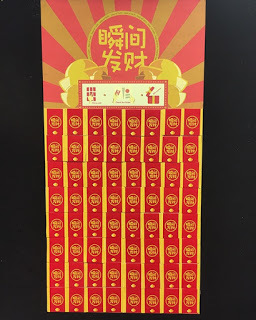 The House of the Rising Tikam.
The House of the Rising Tikam.A ruin of many a poor boy.It was 1972, and we were excited to be back in school. Unlike the previous years, our Standard Three class was in the afternoon session. But like the year before that, we also had a fierce-looking master as our class teacher. It was just the second day into the schooling year. Formal teaching had not started, and everyone was so excited seeing each other after the long end-of-year break.
As in the previous year too, OBK seems to be the most popular student in the class. Like ants to sugar, everyone was pulled to his table between lessons. The loud conversations and the exclamatory remarks naturally drew me to OBK's corner. I was wondering what tall story was he up to this time.
There he was collecting coins and returning the balance. Naturally, I was drawn in, curious in wanting to know what all that money translation was about. In between of pocketing the money and answering to his 'clients', OBK briefly explained his proposal. He was to issue a piece of paper bearing his name and a promise. If one were to keep that paper till the beginning of the next school year, he could claim his dues. A paper worth 10 cents and would be worth 30 the following year. Wow, a 200% returns!
His offer was being snapped up like hotcakes. The proposal appeared too simple. Just by tucking a piece of paper into my wallet and leaving it to rot would earn money. That sounded like a good deal. I paid my 10 cents and patted myself for being smart.
Time flew. Standard Three passed us by. Mr Beh, our class-master, proved to be a tyrant after all. With his secret weapon of pinching the inner thigh, pulling the side-burns and public stripping of students, he thought he was imparting wisdom to his students.
1973 came without much hoopla. I was excited thinking of the thirty cents that I was due to get, counting all the days for school to start.
 All the joy of the remunerations came down to zilch when all of us arrived at school on that day. OBK was no more to be found. Maybe he may come the next day, we thought. Nothing. And the next day. And the next day. He had apparently changed school, away to another state. That was it. The promise of a 'windfall', by our own standards, came tumbling down.
All the joy of the remunerations came down to zilch when all of us arrived at school on that day. OBK was no more to be found. Maybe he may come the next day, we thought. Nothing. And the next day. And the next day. He had apparently changed school, away to another state. That was it. The promise of a 'windfall', by our own standards, came tumbling down. Till this day, we were left wondering. Did he plan such an elaborate plan knowing quite well that he and his family were moving? Was it just a scam to get quick cash to finance his whatever he was up to?
Anyway, an experience like this in School of Hard Knocks built our mantle in dealing with the challenges in life as we eased ourselves into adulthood. Parents never knew about it. We just let it be and moved on with life. Smarter!

Come to think of it, Jho Low's modus operandi smells much like OBK's - promise the moons and the stars to clients whilst JL and MO1 have a whale of a time.
https://asok22.wixsite.com/real-lesson
 This work is licensed under a Creative Commons Attribution 4.0 International License.
This work is licensed under a Creative Commons Attribution 4.0 International License.http://asok22.wix.com/real-lesson
http://.facebook.com/farouk.gulsara
www.riflerangeboy.com

Published on October 02, 2018 16:01
September 30, 2018
In the grandeur of the grand gardens of Granada...

One of the most memorable spots in the Spanish ring is Granada. As in other places in Southern Spain, every conqueror and civilisation that laid his claim on this piece of land managed to leave their mark here.
Granada got its name from an Arabic word meaning 'hill of strangers'. It became a vital hideout of the Al-Andalus after the Muslim invaders, the Nasrids, decided to build their fortress up in the hills. With their advanced engineering prowess and creative designs, they managed to divert the flow of a river, create a tributary to irrigate the highland, built a castle fit for a king together with an eye-soothing garden to match.
The result of this is the Alhambra atop the Assabica hill. It has a Moorish palace with the exotic and elegant design using the help of Nature and natural light.
Leaders who came after them added their extensions to the main structure. The Christian conquistadors and the Church which followed also left their mark. Emperor Charles V even had an exquisite palace constructed, which he never lived.
Alhambra with the city of Albaicin was declared UNESCO heritage in 1984.
 You would expect a country with a sunny predisposition not to be associated with skiing. Hold behold, somewhere in the horizon stands the Sierra Nevada the third highest peak in Europe. During winter, these snow-capped peaks draw winter sports enthusiasts.
You would expect a country with a sunny predisposition not to be associated with skiing. Hold behold, somewhere in the horizon stands the Sierra Nevada the third highest peak in Europe. During winter, these snow-capped peaks draw winter sports enthusiasts. Generalife - the garden associated with Alhambra
Generalife - the garden associated with Alhambra Spanish Garden
Spanish Garden State Emblem
State Emblem The scenery from the Queen's chambers
The scenery from the Queen's chambers The stalactite motif on the inner surface of the dome.
The stalactite motif on the inner surface of the dome.
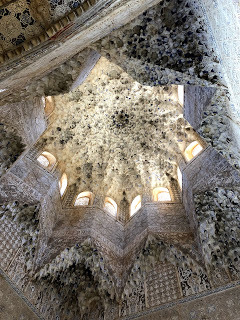
 An anomaly as depictions of lifeforms are rare in Muslin architecture.
An anomaly as depictions of lifeforms are rare in Muslin architecture.
 Patio of Lions
Patio of Lions Alhambra
Alhambra










 Built after Emperor Charles V made a stopover. Completed many years later. Sadly he never lived here.
Built after Emperor Charles V made a stopover. Completed many years later. Sadly he never lived here. The skyline of Granada city, Albaicin.
The skyline of Granada city, Albaicin.



 Recurring motif: No Victor but Allah
Recurring motif: No Victor but Allah



Alhambra and Generalife are living proofs that the Muslim practitioners of yesteryears were not fatalistic but believed in using aql (intellect) in solving worldly problems. Irrigating a dry plateau, they created a picturesque garden which stands stark in contrast its plain-hued scarcely vegetated surroundings.
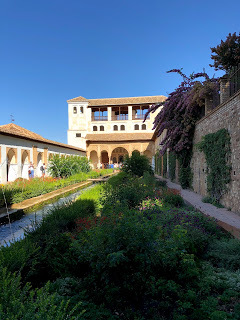
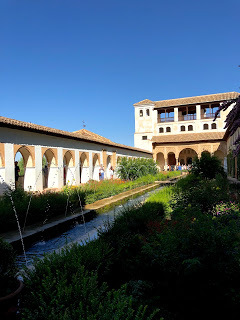
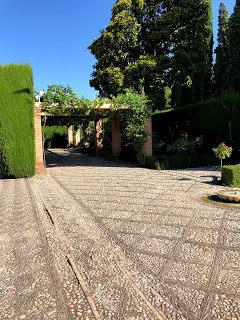
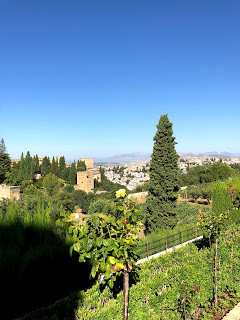
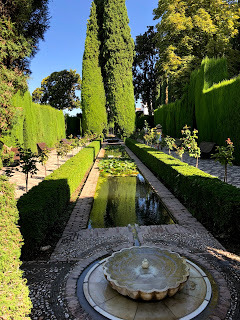
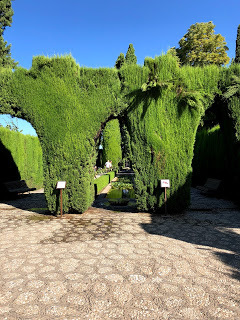
Flamenco is the traditional dance of the Roma people (not PC to refer to them as gipsies). Ostracised by society for their hue and nomadic lifestyles, their melancholic expressions of their plight forms their pastime. It is said that the performance in the cave of Sacromonte gives one of high quality. The following Flamenco show was seen at a restaurant among the narrow streets of the Albaicin Muslim quarters.
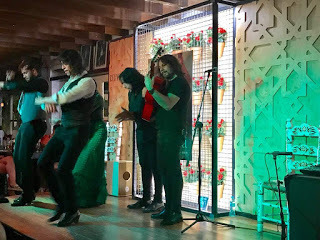
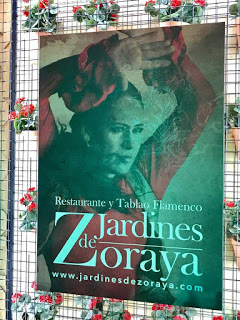
Spain is no short of Cathedrals - Granada Cathedral.
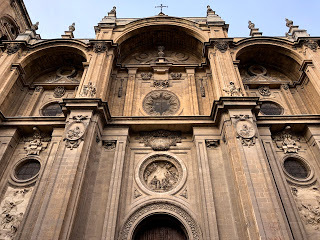
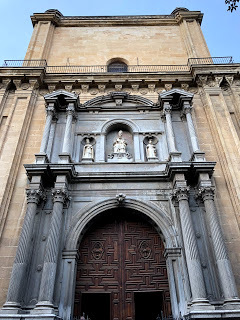
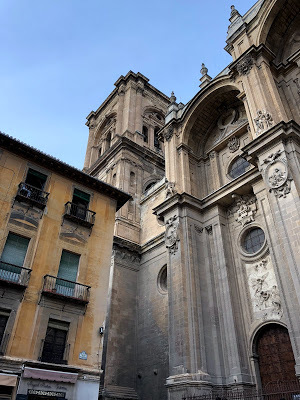
A word of caution: Entrance to many of these heritage sites are regulated. It is advisable to purchase tickets in advance. Tickets are not always available upon arrival.http://asok22.wix.com/real-lesson
http://.facebook.com/farouk.gulsara
www.riflerangeboy.com

Published on September 30, 2018 15:31
September 28, 2018
Unsettled business?
Appa was never a friendly person. In his lifetime, I never saw him had friends coming over for a jolly good time or, he, being in the company of buddies or workmates for one. He is a man of few words. His idea of relaxation is the company of himself, within the confines of the four walls of his home and the accompaniment of his faithful transistor radio.
He is one who taught me that so much could be expressed without verbalising a single word. Bonding can be shown without any unnecessary spoken word or meaningless display of emotion. He could spend a whole hour connecting with his sibling seated in a room for a full hour without a single sound. In short, he was economical with his words and not so expressive in his actions.
All that, however, took a 180º turn when it came to Tango. Tango, not of the Tango and Cash fame, but was a lowly mutt who gasped his last breath quite recently after 13 years of existence. That would equal to 91 in human's equivalent.
Like Appa, Tango was also quite selective of his acquaintances. Known for his ferociousness, he was feared amongst the feline population and even the stray dog community. In many instances, he had defeated and had bought home carcasses of his kill on his occasional escapes from his home during the mating seasons. He was not particularly cordial to visitors of the humankind either.
Again, all that changed when it came to Appa. Hundreds of metres away, hearing the whirring of his motorcycle engine, Tango would spring to life. Wagging his tail, ear sprouting high, barking in playful, excited tone and jumping around, he was quite open with his display of pleasure. On Appa's part, he was never short of treats and dog food for Tango. Together, they would sit together contemplating and staring into nothing.
Now that both of them are no longer present on Earth, they would probably continue their ponderings in the ethereal world.
Perhaps, all living things have a soul. Maybe, people and other beings connect at a primal level. The interactions of the souls in the cycle of births and rebirths make us all meet each other in different realms. We may have to finish unsettled businesses of our previous lives. Unfortunately, we cannot seem to remember. If karma is to punish us for our past shortcomings, is it unfair to punish us for something we do not know? How are we to amend the mistakes that are unknown?
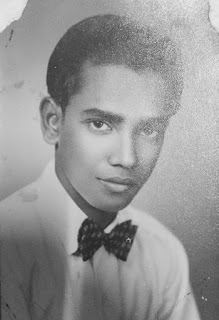
 http://asok22.wix.com/real-lesson
http://asok22.wix.com/real-lesson
http://.facebook.com/farouk.gulsara
www.riflerangeboy.com
He is one who taught me that so much could be expressed without verbalising a single word. Bonding can be shown without any unnecessary spoken word or meaningless display of emotion. He could spend a whole hour connecting with his sibling seated in a room for a full hour without a single sound. In short, he was economical with his words and not so expressive in his actions.
All that, however, took a 180º turn when it came to Tango. Tango, not of the Tango and Cash fame, but was a lowly mutt who gasped his last breath quite recently after 13 years of existence. That would equal to 91 in human's equivalent.
Like Appa, Tango was also quite selective of his acquaintances. Known for his ferociousness, he was feared amongst the feline population and even the stray dog community. In many instances, he had defeated and had bought home carcasses of his kill on his occasional escapes from his home during the mating seasons. He was not particularly cordial to visitors of the humankind either.
Again, all that changed when it came to Appa. Hundreds of metres away, hearing the whirring of his motorcycle engine, Tango would spring to life. Wagging his tail, ear sprouting high, barking in playful, excited tone and jumping around, he was quite open with his display of pleasure. On Appa's part, he was never short of treats and dog food for Tango. Together, they would sit together contemplating and staring into nothing.
Now that both of them are no longer present on Earth, they would probably continue their ponderings in the ethereal world.
Perhaps, all living things have a soul. Maybe, people and other beings connect at a primal level. The interactions of the souls in the cycle of births and rebirths make us all meet each other in different realms. We may have to finish unsettled businesses of our previous lives. Unfortunately, we cannot seem to remember. If karma is to punish us for our past shortcomings, is it unfair to punish us for something we do not know? How are we to amend the mistakes that are unknown?

 http://asok22.wix.com/real-lesson
http://asok22.wix.com/real-lessonhttp://.facebook.com/farouk.gulsara
www.riflerangeboy.com

Published on September 28, 2018 15:01
September 26, 2018
The key to the future in the past?
They say that the key to the future is in the past. Really? Many do not agree with this statement.
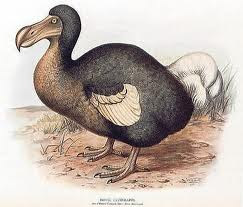 Dodo bird - from the past!
Dodo bird - from the past!
Sure, how would one know that fire scalds if he is not given the opportunity to feel the brunt of heat traversing on the tips of the finger? Once burnt twice shy, they say. The mere thought of the pain of being scorched is enough to keep one on his toes to avoid the same experience.
The memory of the misery of a checkered past continually playing in mind is a sure way the same mistake and even be a stepping stone for higher achievement. A regular reminder of the past may spur to strive harder and remind one of the missions in hand.
On the other hand, we are accused of clinging on to the past, living in the past, drawing in a shell and residing in the self-pity or nostalgia. As if nostalgia was a bad word!
In environment concerns, records of the past are needed to predict the future. Our knowledge about extinct species may prevent further disappearances of lifeforms. Data from other planets in the solar system may help to avert the bleak future that stands in front of us if they do not care for Earth.
The same goes for our history which tends to repeat itself. Napoleon and Hitler did not have the benefit of hindsight before attacking Russia. They would have probably resisted engaging in war in winter if they have given adequate attention to history.
It is anybody's guess what lies in front of us. Nobody has a crystal ball to predict our future. We make our moves and decide as we go on. Using our mental faculty and the experience of our previous failures, we take calculated risks and plunge on into life, hoping for the best.
Life is a constant change. We accept, we grow, we reinvent, and we tread with caution.http://asok22.wix.com/real-lesson
http://.facebook.com/farouk.gulsara
www.riflerangeboy.com
 Dodo bird - from the past!
Dodo bird - from the past!Sure, how would one know that fire scalds if he is not given the opportunity to feel the brunt of heat traversing on the tips of the finger? Once burnt twice shy, they say. The mere thought of the pain of being scorched is enough to keep one on his toes to avoid the same experience.
The memory of the misery of a checkered past continually playing in mind is a sure way the same mistake and even be a stepping stone for higher achievement. A regular reminder of the past may spur to strive harder and remind one of the missions in hand.
On the other hand, we are accused of clinging on to the past, living in the past, drawing in a shell and residing in the self-pity or nostalgia. As if nostalgia was a bad word!
In environment concerns, records of the past are needed to predict the future. Our knowledge about extinct species may prevent further disappearances of lifeforms. Data from other planets in the solar system may help to avert the bleak future that stands in front of us if they do not care for Earth.
The same goes for our history which tends to repeat itself. Napoleon and Hitler did not have the benefit of hindsight before attacking Russia. They would have probably resisted engaging in war in winter if they have given adequate attention to history.
It is anybody's guess what lies in front of us. Nobody has a crystal ball to predict our future. We make our moves and decide as we go on. Using our mental faculty and the experience of our previous failures, we take calculated risks and plunge on into life, hoping for the best.
Life is a constant change. We accept, we grow, we reinvent, and we tread with caution.http://asok22.wix.com/real-lesson
http://.facebook.com/farouk.gulsara
www.riflerangeboy.com

Published on September 26, 2018 09:30

